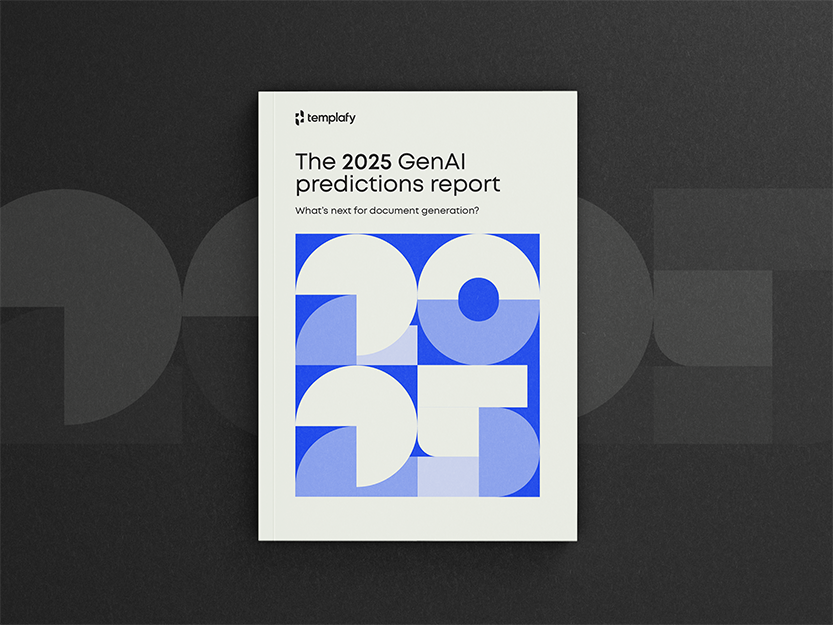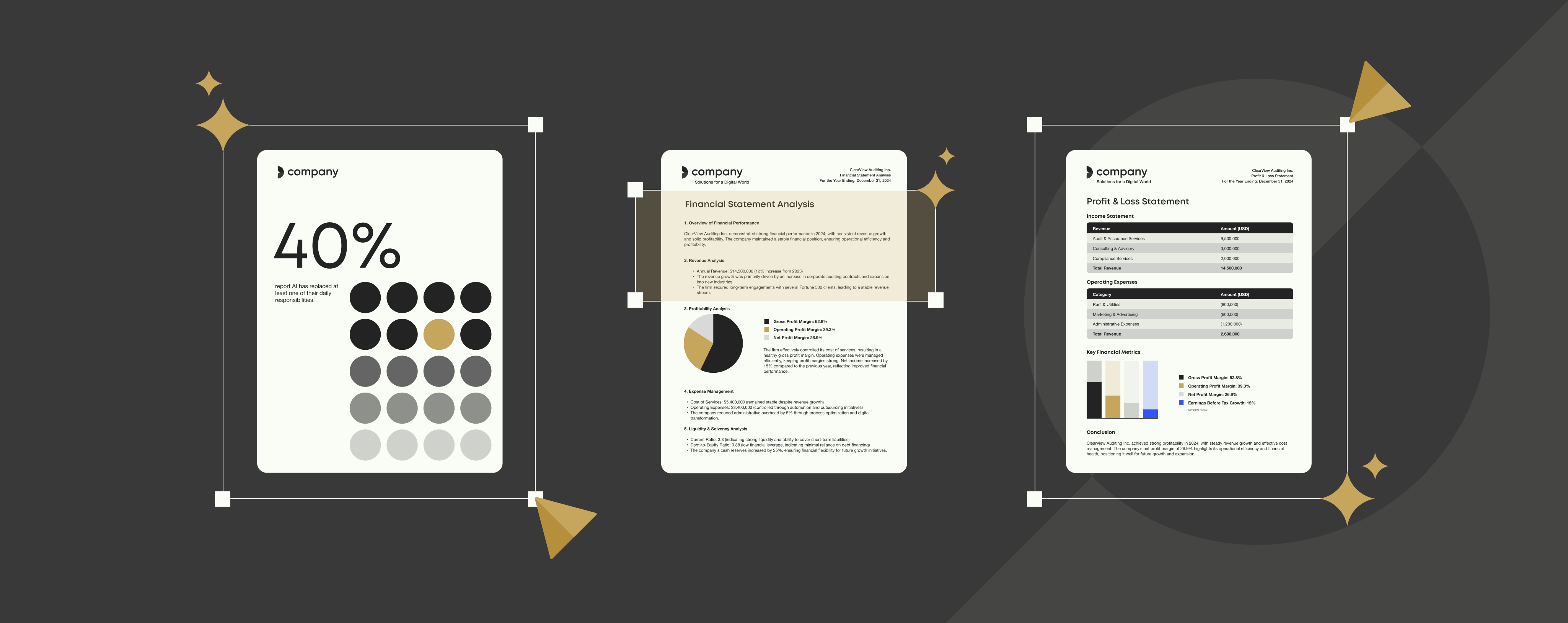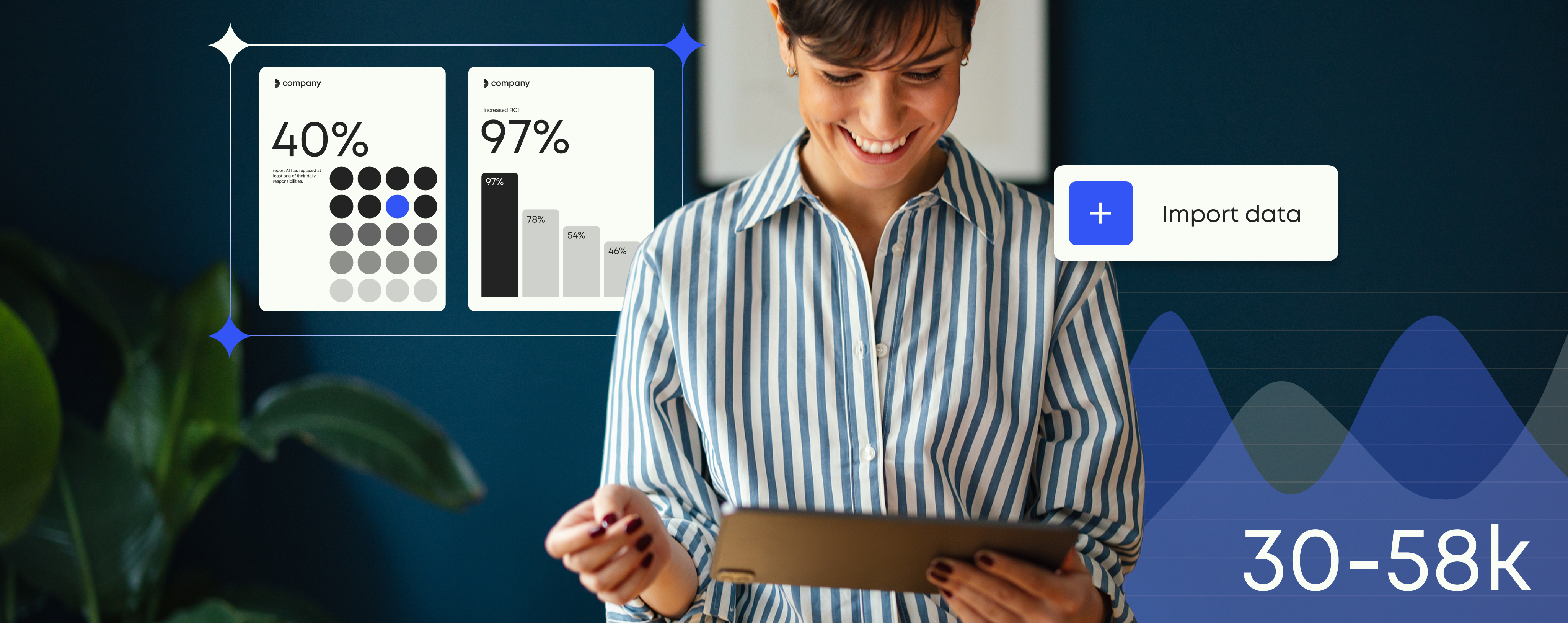7 powerful use cases for AI in accounting firms

How to mitigate risks and maximize AI’s potential for accounting teams
Every accounting consultant knows the drill. End-of-year reporting rolls around, and so begins the late nights, spreadsheets, and high-stakes number crunching.
One small error could lead to financial misstatements—and that means time-consuming audits and reviews, and even penalties. Not to mention a big dent in your reputation.
With the heavy workloads accounting consultants face, AI solutions are an ideal fit. The right tools can free your team from busywork, automate repetitive tasks, and minimize human error. But 73% of accounting firms are yet to adopt AI due to concerns over accuracy (58%), data privacy (55%) (cfo.com) and AI replacing accounting jobs (Thomson Reuters).
The truth is, AI can’t replace accounting consultants. With work this complex and significant, someone has to be held accountable (pun intended). Contrary to common fears, AI makes accounting services more compliant, efficient, and accurate. The key is knowing how and when to use it.
In this blog, we break down the risks of AI in accounting services, how to mitigate them, and the top seven use cases that leading accounting firms use for maximum ROI.
How can AI be used in accounting?
AI in accounting is the use of artificial intelligence technologies to automate financial processes within the accounting services industry. There are tons of use cases for AI in accounting (we’ll get into these shortly), but they all achieve one or more of the following benefits:
- Cut down on repetitive work: AI takes over routine tasks like data entry, invoice processing, and transaction matching, so accounting consultants can focus on strategy and analysis.
- Ensure compliance automatically: Monitor financial records in real time, flag inconsistencies, and keep reports aligned with regulatory requirements.
- Reduce errors and improve accuracy: AI eliminates human mistakes and improves data reliability by automating calculations, reconciliations, and reporting.
- Speed up financial processes: Accelerate tasks like month-end close, bank reconciliations, and financial reporting
,to make faster and more data-driven decisions. - Deliver better financial insights: AI-powered analytics detect trends, predict cash flow, and offer actionable insights to improve financial planning.
The challenges of implementing AI in accounting—and how to mitigate them
Given the scope and severity of accounting work, it makes sense that there would be concerns around using AI in the accounting services industry.
While accounting firms have been slow to roll out AI-driven processes, individuals are already finding ways to integrate GenAI into their work. Many are turning to tools like ChatGPT over industry-specific solutions, with 27% of tax professionals using open-source tech like ChatGPT to streamline tasks.
For firms, this raises an important question: How can AI be embraced in a way that enhances efficiency while maintaining compliance and control? The best approach isn’t to restrict AI use—it’s to integrate it into workflows strategically. By doing so, firms can harness AI’s productivity benefits while ensuring security, accuracy, and regulatory alignment.
Here are the main challenges and how to mitigate them:
- Legacy systems: Many firms rely on outdated accounting software that doesn’t integrate easily with AI tools. Investing in cloud-based platforms that support AI capabilities can help modernize workflows without overhauling entire systems.
- Data privacy: AI systems handle highly sensitive financial information, creating concerns over data security and regulatory compliance. Implementing robust encryption, access controls, and AI models that comply with data protection regulations (e.g., GDPR, SOX) can reduce risk.
- Initial investment: AI solutions require upfront costs in software, infrastructure, and training, which can be a barrier for smaller firms. Prioritizing AI tools that integrate with existing accounting systems and starting with small-scale implementations can provide ROI before rolling out further.
- Technological barriers: Many firms lack the in-house expertise to implement and manage AI effectively. Partnering with AI vendors that offer strong customer support and training programs can bridge the knowledge gap and accelerate adoption.
- Ethical and transparency issues: Some AI models operate as “black boxes,” making it difficult to understand how they arrive at decisions. Using explainable AI (XAI) and implementing audit trails for AI-generated financial reports can ensure accountability and trust in AI outputs.
- Employee resistance and training needs: Some accountants worry AI will replace their roles, leading to reluctance in adoption. Positioning AI as an enhancement to human expertise—rather than a replacement—and offering training on how to use AI to improve efficiency can boost acceptance and adoption.
How AI is transforming accounting: 7 high-impact use cases
Despite the challenges, AI is already transforming accounting.
Major firms are leading the way, proving that AI-powered tools can drive accuracy, compliance, and efficiency. Deloitte, PwC, EY, and KPMG are incorporating AI into audits, risk assessment, and tax planning. PwC’s GL.ai detects accounting anomalies, Deloitte’s Argus analyzes contract risk, and EY’s Helix is streamlining tax compliance.
We’ve gathered the top seven use cases for AI in accounting services today. Here they are, and why they matter:
ai
Use cases
- AI-powered proposal, RFP, and pitch deck automation
- Tax compliance and optimization
- Smart financial reporting
- AI-driven client advisory and decision support
- Audit and compliance reporting
- AI-powered budgeting and financial forecasting
- Contract analysis and management
1. AI-powered proposal, RFP, and pitch deck automation
Winning new business in a competitive industry like accounting services means producing proposals, RFP responses, and pitch decks that are accurate, compliant, and tailored to each client—fast. AI is transforming this process by automating content generation, pulling in pre-approved data, and ensuring brand consistency across documents.
With AI-driven tools, pursuit teams can create polished, client-specific proposals in minutes—cutting manual effort while enhancing precision. Pair it with rules-based automation to keep branding and compliance on point.
Benefits: Cuts down document creation time, minimizes financial and compliance errors, and helps firms deliver high-quality, tailored pitches at scale.
2. Tax compliance and optimization
Staying up to date with constantly evolving tax regulations is a major challenge for accounting firms. AI tax engines can track regulatory changes in real-time, automate tax filings, and flag opportunities for tax savings.
Benefits: Reduces tax errors, ensures businesses remain compliant, and prevents last-minute scrambling.
3. Smart financial reporting
Financial reporting is a critical yet time-intensive process. AI tools such as EY’s Helix and Deloitte’s Argus generate comprehensive financial reports automatically, providing real-time insights without manual intervention.
Benefits: Faster, more accurate financial insights that empower data-driven decision-making.
4. AI-driven client advisory and decision support
AI doesn’t just automate tasks—it enhances decision-making. Advanced AI models analyze vast financial datasets to detect anomalies, identify risks, and generate actionable insights. This allows accountants to move beyond number-crunching into strategic advisory roles.
Benefits: Strengthens risk management, enhances client trust, and helps accountants transition into higher-value advisory services.
5. Audit and compliance reporting
Regulatory compliance is a major concern for accounting firms. AI-driven audit tools streamline compliance reporting by automatically generating audit trails and detecting inconsistencies in financial records.
Benefits: Enhances transparency, reduces the risk of regulatory penalties, and accelerates audit processes.
6. AI-powered budgeting and financial forecasting
Accurate financial forecasting is essential for strategic planning. Machine learning models analyze historical financial data, market trends, and economic indicators to predict future cash flows and financial performance.
Benefits: Improved forecasting accuracy, better financial planning, and reduced reliance on guesswork.
7. Contract analysis and management
AI-powered Natural Language Processing (NLP) tools optimize contract review by extracting key clauses, flagging risks, and ensuring compliance with legal and financial regulations. Create engagament letters, management letters and other documents following the latest guidelines like International Standard on Quality Management (ISQM), Canadian Standard on Quality Management (CSQM) Etc.
Benefits: Reduces the time spent reviewing contracts, enhances contract accuracy, and ensures compliance.
Stay ahead with GenAI: 4 predictions for 2025 success
The second wave of GenAI is here, and it will belong to businesses that make AI a core part of their daily workflows.

Templafy: AI-powered document generation for accounting professionals
AI is already transforming accounting services. But without the right systems in place, firms risk inefficiency, compliance issues, and brand inconsistencies. That’s where Templafy can help.
Templafy is the leading AI-powered document generation platform, enabling accounting professionals to create accurate, compliant, and on-brand documents with maximum efficiency.
There’s a reason we’re trusted by industry leaders like KPMG and BDO: Templafy helps firms eliminate the hassle and risk from high-stakes financial documents, ensuring every report, proposal, and engagement letter is built on approved, up-to-date content.
How it works
Templafy plugs document automation tools directly into the apps that accounting consultants already use, like Microsoft Office, Google Workspace, and Salesforce, so they never have to leave the apps they know and love.
On average, teams using Templafy save over 30% of the time they’d typically spend on manual document tasks, allowing them to focus on revenue-driving work instead.
Here’s how:
- Automated document creation: Generate financial reports, client proposals, and audit documents instantly, without repetitive manual work.
- Built-in compliance: Ensure all documents adhere to regulatory and brand standards, reducing compliance risks.
- Seamless integration: Work directly within Microsoft Office, Google Workspace, and Salesforce, so there’s no need to switch between tools.
- Faster client communication: AI-driven templates make it easy to produce engagement letters, contracts, and advisory reports at speed—without sacrificing accuracy.
“At BDO, our focus is on delivering tangible results in a seamless and efficient way. The quality and consistency of the documents we deliver to our clients is non-negotiable. Using Templafy to streamline that process assures quality and allows our team to spend more time building client relationships.”
Brion Hendry
Partner and Assurance Innovation Leader, BDO Canada
Book a demo
Join more than four million users worldwide who trust Templafy to accelerate business content creation with AI.
Book a demo to see how Templafy can transform your workflows.



